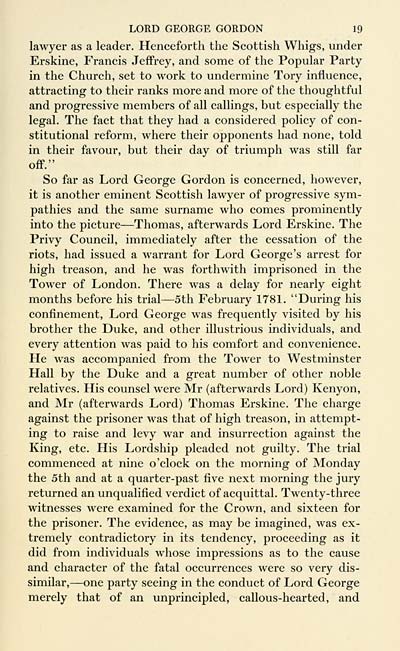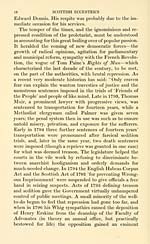Download files
Complete book:
Individual page:
Thumbnail gallery: Grid view | List view

LORD GEORGE GORDON 19
lawyer as a leader. Henceforth the Scottish Whigs, under
Erskine, Francis Jeffrey, and some of the Popular Party
in the Church, set to work to undermine Tory influence,
attracting to their ranks more and more of the thoughtful
and progressive members of all callings, but especially the
legal. The fact that they had a considered policy of con-
stitutional reform, where their opponents had none, told
in their favour, but their day of triumph was still far
off."
So far as Lord George Gordon is concerned, however,
it is another eminent Scottish lawyer of progressive sym-
pathies and the same surname who comes prominently
into the picture — Thomas, afterwards Lord Erskine. The
Privy Council, immediately after the cessation of the
riots, had issued a warrant for Lord George's arrest for
high treason, and he was forthwith imprisoned in the
Tower of London. There was a delay for nearly eight
months before his trial — 5th February 1781. "During his
confinement, Lord George was frequently visited by his
brother the Duke, and other illustrious individuals, and
every attention was paid to his comfort and convenience.
He was accompanied from the Tower to Westminster
Hall by the Duke and a great number of other noble
relatives. His counsel were Mr (afterwards Lord) Kenyon,
and Mr (afterwards Lord) Thomas Erskine. The charge
against the prisoner was that of high treason, in attempt-
ing to raise and levy war and insurrection against the
King, etc. His Lordship pleaded not guilty. The trial
commenced at nine o'clock on the morning of Monday
the 5th and at a quarter-past five next morning the jury
returned an unqualified verdict of acquittal. Twenty-three
witnesses were examined for the Crown, and sixteen for
the prisoner. The evidence, as may be imagined, was ex-
tremely contradictory in its tendency, proceeding as it
did from individuals whose impressions as to the cause
and character of the fatal occurrences were so very dis-
similar, — one party seeing in the conduct of Lord George
merely that of an unprincipled, callous-hearted, and
lawyer as a leader. Henceforth the Scottish Whigs, under
Erskine, Francis Jeffrey, and some of the Popular Party
in the Church, set to work to undermine Tory influence,
attracting to their ranks more and more of the thoughtful
and progressive members of all callings, but especially the
legal. The fact that they had a considered policy of con-
stitutional reform, where their opponents had none, told
in their favour, but their day of triumph was still far
off."
So far as Lord George Gordon is concerned, however,
it is another eminent Scottish lawyer of progressive sym-
pathies and the same surname who comes prominently
into the picture — Thomas, afterwards Lord Erskine. The
Privy Council, immediately after the cessation of the
riots, had issued a warrant for Lord George's arrest for
high treason, and he was forthwith imprisoned in the
Tower of London. There was a delay for nearly eight
months before his trial — 5th February 1781. "During his
confinement, Lord George was frequently visited by his
brother the Duke, and other illustrious individuals, and
every attention was paid to his comfort and convenience.
He was accompanied from the Tower to Westminster
Hall by the Duke and a great number of other noble
relatives. His counsel were Mr (afterwards Lord) Kenyon,
and Mr (afterwards Lord) Thomas Erskine. The charge
against the prisoner was that of high treason, in attempt-
ing to raise and levy war and insurrection against the
King, etc. His Lordship pleaded not guilty. The trial
commenced at nine o'clock on the morning of Monday
the 5th and at a quarter-past five next morning the jury
returned an unqualified verdict of acquittal. Twenty-three
witnesses were examined for the Crown, and sixteen for
the prisoner. The evidence, as may be imagined, was ex-
tremely contradictory in its tendency, proceeding as it
did from individuals whose impressions as to the cause
and character of the fatal occurrences were so very dis-
similar, — one party seeing in the conduct of Lord George
merely that of an unprincipled, callous-hearted, and
Set display mode to: Large image | Transcription
Images and transcriptions on this page, including medium image downloads, may be used under the Creative Commons Attribution 4.0 International Licence unless otherwise stated. ![]()
| Early Gaelic Book Collections > Ossian Collection > Scottish eccentrics > (35) |
|---|
| Permanent URL | https://digital.nls.uk/81908764 |
|---|
| Description | Selected books from the Ossian Collection of 327 volumes, originally assembled by J. Norman Methven of Perth. Different editions and translations of James MacPherson's epic poem 'Ossian', some with a map of the 'Kingdom of Connor'. Also secondary material relating to Ossianic poetry and the Ossian controversy. |
|---|
| Description | Selected items from five 'Special and Named Printed Collections'. Includes books in Gaelic and other Celtic languages, works about the Gaels, their languages, literature, culture and history. |
|---|

